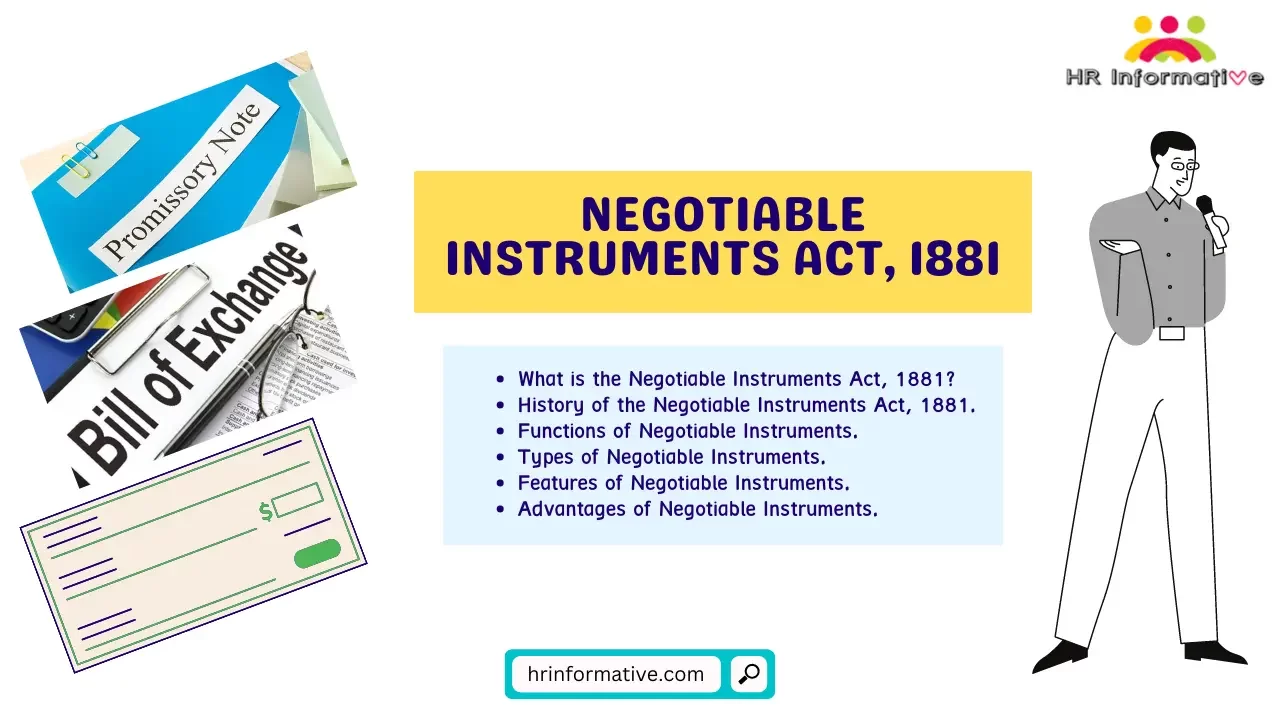Negotiable Instruments Act, 1881 is a law of India which is related to Promissory Notes, Bills of Exchange and Cheques. The word ‘Negotiable’ means transferability and ‘Instruments’ means peace of paper or any document, hence a Negotiable Instrument is actually a written document which is transferable.
Financial institutions, industry, organizations and even common people working all over India mostly do their transactions through cheques. Along with the facilities that come with financial transactions through cheques, problems also arise. The ‘Negotiable Instruments Act, 1881’ has a provision for registering complaints about business through cheques.
History of Negotiable Instruments Act, 1881
The Negotiable Instruments Act was originally prepared by the Third Indian Law Commission in 1866 and was introduced in Council in December 1867 and referred to a Select Committee.
Objections were raised by the trading community to the many deviations from English law that it contained. In 1877 the bill had to be redrafted. After a sufficient period had elapsed for criticism by local governments, high courts and chambers of commerce, the bill was revised by a select committee. Despite this, the bill could not reach the final stage.
By order of the Secretary of State in 1880, the Bill was to be referred to a new Law Commission. On the recommendation of the New Law Commission, the Bill was redrafted and again sent to a Select Committee, which accepted most of the additions recommended by the New Law Commission. The draft thus prepared for the fourth time was presented to the Council and passed in 1881 as the Negotiable Instruments Act, 1881.
Amendments in Negotiable Instruments Act, 1881
Everyone prefers to carry a small piece of paper known as a Cheque rather than carrying the currency worth the value of the Cheque. Before 1988 there was no provision to restrain the person issuing the Cheque without having sufficient funds in his account. In order to ensure promptitude and remedy against the defaulters of the Negotiable Instrument, a criminal remedy of penalty was inserted in the Negotiable Instruments Act, 1881 by amending it with the Negotiable Instruments Act, 1988.
Under this act, the people issuing cheques without having sufficient money in their accounts were considered to be defaulters and were charged a penalty, considering it a criminal offence. The 1988 amendment of the Negotiable Instrument Act helped to control the dishonouring of cheques by specifying it as a criminal activity.
Despite the initial amendment, the act still had numerous ambiguities, leading to varied interpretations by different high courts. To address these gaps, the Negotiable Instrument Act was further revised in 2002, adding five new sections. This updated amendment took effect in 2003.
In 2018 The Negotiable Instruments Act was amended and called The Negotiable Instruments (Amendment) Act, 2018. Two new sections 143A and 148 had been inserted.
Section 143A – Power to direct interim compensation.
Section 148 – Power of Appellate Court to order payment pending appeal against conviction.
Meaning of Negotiable Instruments
- A Negotiable Instrument means is a signed document that promises a sum of payment to a specified person or the assignee.
- Negotiable Instruments mean anything that has a monetary value and is transferable.
- Negotiable Instruments mean a transferable/signed document that promises to pay the bearer a sum of money at a future date or on demand. The payee (the person who is receiving the payment) must be named or indicated on the instruments.
Functions of Negotiable Instruments
- Negotiable instruments are the papers to facilitate payments. The ownership of these documents can be transferred from one person to another before the payment is made.
- This is common for transactions that involve large amounts of money in the current business environment. Also, receiving and making payments in cash can be quite a hassle for both parties.
Types of Negotiable Instruments
As per the Negotiable Instruments Act, 1881 section 13 there are three types of negotiable instruments i.e. Promissory Notes, Bills of Exchange, and Cheques.
1. Promissory Notes
Definition: A “promissory note” is an instrument in writing (not being a bank note or a currency note) containing an unconditional undertaking signed by the maker, to pay a certain sum of money only to, or to the order of a certain person, or to the bearer of the instrument. (Negotiable Instruments Act, 1881 Section 4)
Meaning: A Promissory Note is a legal financial instrument issued by one party, promising to pay the debt owed to another party.
Note: Bank Note or Currency Note is not a promissory note.
2. Bills of Exchange
Definition: A “bill of exchange” is an instrument in writing containing an unconditional order, signed by the maker, directing a certain person to pay a certain sum of money only to, or to the order of, a certain person or to the bearer of the instrument. (Negotiable Instruments Act, 1881 Section 5)
Meaning: Bill of Exchange can be understood as a written negotiable instrument, that carries an unconditional order to pay a specified sum of money to a person or the holder of the instrument, as directed in the instrument by the maker. The bill of exchange is either payable on demand or after a specified term.
Types of Bills: Inland Bills, Foreign Bills, Trade Bills, Accommodation Bills and Bills in Sets.
3. Cheque
Definition: A “cheque” is a bill of exchange drawn on a specified banker and not expressed payable otherwise than on demand. (Negotiable Instruments Act, 1881 Section 6)
Meaning: A cheque refers to a negotiable instrument that contains an unconditional order to the bank to pay a certain sum mentioned in the instrument, from the drawer’s account, to the person to whom it is issued, or to the order of the specified person or the bearer.
Note: A cheque is a species of a bill of exchange, but it has the following two additional qualifications:
- It is always drawn on a specified banker, and
- It is always payable on demand.
Features of Negotiable Instruments
There are the following features of Negotiable Instruments:
1. Easily Transferable
A negotiable instrument is easy to transfer. The transfer involves no formalities or much paperwork. The ownership of an instrument can be transferred simply by delivery or by a valid endorsement.
2. Must Be in Written
Negotiable Instruments must be in written format. That should consist of handwritten notes, printed, engraved, typed, etc.
3. Time of Payment Must be Certain
If the order is flexible for payment time, then such an order is not considered a negotiable instrument. Even if there is no fixed date, there must be a fixed period.
For example, if the timing of payment depends on the death of a specific person, it is considered a negotiable instrument, since death is a specific event.
4. Payee Must Be Certain
The person who receives the payment must be a specific person or persons. Also, there can be more than one payee for a negotiable instrument. Under “Person” also includes bodies such as corporates, trade unions, chairmen, secretaries, etc.
Advantages of Negotiable Instruments
There are the following advantages of Negotiable Instruments:
- It is simple and easy to understand.
- It is not so lengthy.
- It can be transferred easily.
- It is more convenient than carrying cash in hand.
- The debtor can stop the payment, if necessary.
Dishonour of Cheque
Sections 138 to 142 deal with the dishonour of cheques and provide for criminal penalties in the event of dishonour of cheques for insufficiency of funds.
Penalty for Dishonor of the Cheque
The drawer, under Section 138, may be punished with imprisonment up to 2 years or with a fine up to twice the amount of the cheque or with both.
However, in order to attract the aforesaid penalties, the following conditions must be satisfied:
- The cheque should have been dishonoured due to insufficiency of funds in the account maintained by him/her with a banker for payment of any amount of money to another person from out of that account.
- The payment for which the cheque was issued should have been for the discharge of a legally enforceable debt or liability in whole or part of it.
- The cheque should have been presented within 3 months from the date on which it is drawn.
Conclusion
The Negotiable Instruments Act plays an important role in economic and finance related matters that are essential to modern day commercial transactions. It makes the payments easy and transferable. The act also tells the liabilities, duties and responsibilities of both the drawer and drawee.
Download Negotiable Instruments Act, 1881
Frequently Asked Questions (FAQs)
Q: When the Negotiable Instruments Act came into force?
Ans: The Negotiable Instruments Act came into force on 09 December 1881.
Q: How many types of Negotiable Instruments are there?
Ans: There are three types of Negotiable Instruments i.e. Promissory Notes, Bills of Exchange and Cheques.
Q: What is the benefit of a Negotiable Instrument?
Ans: You do not need to carry large amounts of cash to pay someone. You can pay the amount with this small piece of paper which is called a negotiable instrument.
Q: In which year the last amendment was done in the Negotiable Instruments Act?
Ans: In the year 2018, the last amendment was done.
Q: How many sections were added to the Negotiable Instruments (Amendment) Act, 2018?
Ans: Sections 143A and 148 were added.
Related Posts :



